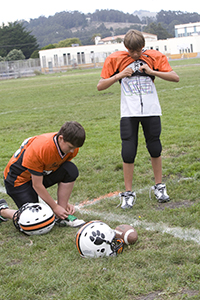Sports Injury Prevention
Can sports injuries be prevented?
Many sports injuries can be prevented by learning about the sport and making sure your child has the necessary protection.

Before signing your child up for a sport, you should consider:
The temperature. Cooler weather is safer.
The playing surface. Some surfaces will reduce the impact on your child’s joints, reducing injuries.
Traffic. Sharing the road with automobiles can raise the risk of injury.
Gear safety. Broken or unsafe helmets, pads, or surfaces can cause injury.
Rules of play. Strict enforcement of rules protects participants.
Medical evaluations. A checkup before the season can find hidden problems.
Your child will need the following:
Safety gear and protective devices, such as pads, helmets, and gloves
Time to gradually increase his or her activity to avoid doing "too much, too soon"
Shoes that are appropriate for the sport and fit properly
Rehabilitation of any previous injuries before continuing or starting a sport
Safety gear should be sport-specific and may include such items as:
Goggles
Mouthguards
Protective pads for the shins, elbows, and knees
Helmets
Make sure your child's safety gear fits properly. Also make sure all sports equipment, such as bats, baskets, and goals, are in good working condition. Repair any damage or replace the item entirely. The playing area should be free from debris and water.
Physical checkup
Before your child signs up for a particular sport, he or she should have a sports physical. These physicals can reveal your child's physical strengths and weaknesses and help determine which sports are best. A sports physical is a health exam. Your child’s healthcare provider will ask about your child’s medical history and check his or her:
Height and weight
Heart and heart rate
Lungs
Belly
Vision and hearing
Joints
Bones
Muscles
Age
Starting a sport too young may not be good for your child. The American Academy of Pediatrics (AAP) says that age 6 is when children can understand the idea of teamwork. But no 2 children are alike, and some may not be mentally or physically ready to play a team sport even at age 6. You should make your decision on whether to allow your child to take part in a particular sport based on the following:
Age
Weight
Build
Physical development
Emotional development
Child's interest in the sport
Staying healthy during play
Children who play hard will sweat. This sweat must be replaced with equal amounts of fluids. This means your child should drink lots of water before, during, and after each practice or game. If your child doesn’t get enough fluids, he or she may get dehydrated.
Give your child about 1 cup of water (or a type of sports drink) every 15 to 20 minutes during heavy exercise. Don't give your child drinks that have carbonation and caffeine, such as soda, energy drinks, or coffee. Also, children in hot, humid weather can become dehydrated even faster. You should consider decreasing or stopping the activity when it is too hot.
The following are the most common symptoms of dehydration. But each child may experience symptoms differently. Symptoms may include:
Thirstiness
Dizziness or lightheaded feeling
Weakness
Headache
Dark-colored urine
Slight weight loss
If your child shows signs of dehydration, make sure he or she gets fluids and a small snack immediately. The symptoms of dehydration may resemble other health conditions or problems. Always check with your child's healthcare provider for a diagnosis.
Connect with us:
Download our App: